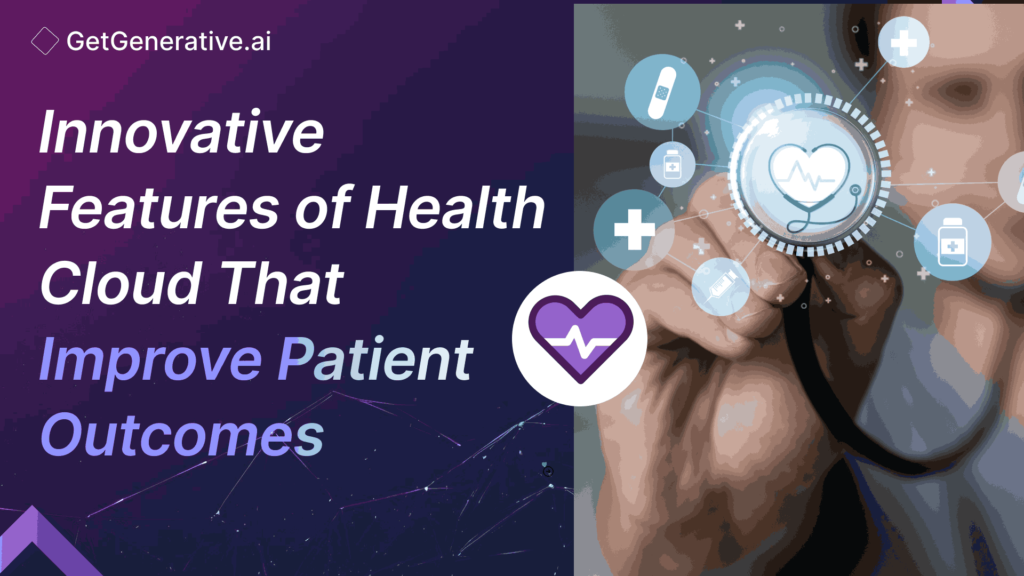Salesforce Health Cloud Features: Innovative Solutions That Improve Patient Outcomes
According to a report by MarketsandMarkets, the global healthcare cloud computing market is projected to reach USD 120.6 billion by 2029 from USD 53.8 billion in 2024, at a high CAGR of 17.5% during the forecast period. This significant growth highlights the increasing adoption of cloud-based solutions like Salesforce Health Cloud, which offers features designed to empower healthcare providers, improve patient engagement, and ensure compliance with regulatory requirements.
In this blog, we will explore Salesforce Health Cloud’s key features and how they can transform healthcare delivery. From Patient 360 to care coordination and telehealth, Salesforce Health Cloud provides a comprehensive solution for modern healthcare challenges.
What is Salesforce Health Cloud?
Salesforce Health Cloud is a healthcare-focused customer relationship management (CRM) platform designed to enable healthcare providers to build stronger patient relationships, streamline care coordination, and leverage data for better decision-making. It integrates various data sources, including electronic health records (EHRs), to provide a unified view of patient data.
This holistic approach allows providers to deliver personalized care, improve patient outcomes, and enhance operational efficiency.
Features
Patient 360
Patient 360 is one of Salesforce Health Cloud’s standout features. It provides healthcare providers with a comprehensive view of a patient’s health data, including medical history, treatment plans, medications, etc. By aggregating data from various sources, Patient 360 enables providers to understand the full context of a patient’s health, leading to more informed decisions and personalized care.
Key Benefits of Patient 360:
- Unified View of Patient Data: Patient 360 consolidates information from multiple sources, providing a single, comprehensive view of each patient.
- Personalized Care Plans: By fully understanding a patient’s health, providers can create more personalized and effective care plans.
- Improved Patient Engagement: Patients feel more understood and cared for when their providers access comprehensive health information.
Care Coordination
Effective care coordination is crucial for delivering high-quality healthcare, especially for complex patient needs. Salesforce Health Cloud facilitates seamless communication and collaboration among care teams, ensuring everyone involved in a patient’s care is on the same page.
How Salesforce Health Cloud Facilitates Care Coordination:
- Shared Care Plans: All patient care team members can access and update care plans in real-time, ensuring everyone is informed of the latest developments.
- Task Management: The platform allows care teams to assign and track tasks, ensuring that no aspect of patient care is overlooked.
- Communication Tools: Built-in communication tools enable secure messaging and collaboration among care team members.
Health Data Integration
Data is often stored in disparate systems in the healthcare industry, making it challenging to get a complete view of a patient’s health. Salesforce Health Cloud addresses this issue through robust health data integration capabilities.
How Salesforce Health Cloud Integrates with Other Healthcare Systems:
- EHR Integration: Salesforce Health Cloud can integrate with electronic health records (EHR) systems, allowing providers to access critical patient data directly within the platform.
- API Connectivity: The platform offers APIs facilitating integration with various healthcare applications, ensuring seamless data flow across systems.
- Data Aggregation: Salesforce Health Cloud aggregates data from multiple sources to provide a unified view of patient information, improving decision-making and care delivery.
Analytics and Insights
Data is only valuable when it can be turned into actionable insights. Salesforce Health Cloud offers powerful analytics tools that help healthcare providers make data-driven decisions.
Key Features of Salesforce Health Cloud Analytics:
- Predictive Analytics: The platform leverages AI and machine learning to predict patient outcomes, enabling proactive care interventions.
- Custom Reports: Providers can generate custom reports on various aspects of patient care, which can help them identify trends and areas for improvement.
- Population Health Management: Salesforce Health Cloud enables providers to analyze data at the population level, helping them identify and address public health issues.
Telehealth and Remote Monitoring
The COVID-19 pandemic has accelerated the adoption of telehealth and remote monitoring solutions. Salesforce Health Cloud supports these capabilities, allowing providers to deliver care beyond the traditional clinical setting.
Telehealth and Remote Monitoring Features:
- Virtual Consultations: Providers can conduct virtual consultations with patients, ensuring continuity of care even when in-person visits are impossible.
- Remote Monitoring: The platform supports integrating remote monitoring devices, allowing providers to track patients’ health metrics in real time.
- Patient Engagement: Telehealth and remote monitoring enhance patient engagement by making it easier for patients to access care and communicate with their providers.
Security and Compliance
Security and compliance are paramount in the healthcare industry. Salesforce Health Cloud is designed with robust security measures to protect patient data and ensure compliance with healthcare regulations like HIPAA.
Security Measures in Salesforce Health Cloud:
- Data Encryption: All data stored in Salesforce Health Cloud is encrypted, protecting it from unauthorized access.
- Access Controls: The platform offers granular access controls, allowing administrators to define who can access specific data types.
- Compliance Certifications: Salesforce Health Cloud complies with various healthcare regulations, including HIPAA, ensuring that providers can confidently use the platform.
Care Team Productivity
Another key benefit of Salesforce Health Cloud is enhancing the productivity of care teams. The platform offers tools and features to streamline workflows and reduce administrative burden.
How Salesforce Health Cloud Enhances Care Team Productivity:
- Automated Workflows: The platform automates routine tasks, allowing care teams to focus on more critical aspects of patient care.
- Task Management: Care teams can assign and track tasks within the platform, ensuring that all aspects of patient care are managed efficiently.
- Real-Time Collaboration: Built-in collaboration tools enable care teams to communicate and coordinate care in real time, reducing delays and improving patient outcomes.
Also Read – Salesforce Health Cloud Implementation Guide
What Security Measures Does Salesforce Health Cloud Implement to Protect Patient Data?
Salesforce Health Cloud implements several security measures to protect patient data, including data encryption, granular access controls, and compliance with healthcare regulations like HIPAA. These measures ensure that patient data is secure and that healthcare providers can confidently use the platform.
How Does Salesforce Health Cloud Integrate with Other Healthcare Systems?
Salesforce Health Cloud integrates with other healthcare systems through EHR integration, API connectivity, and data aggregation. These integration capabilities allow providers to access critical patient data from various sources within a unified platform, improving decision-making and care delivery.
Related Read – Salesforce Products Explained: The Ultimate Guide
Conclusion
Salesforce Health Cloud offers a comprehensive suite of features designed to meet the healthcare industry’s unique needs. From Patient 360 to telehealth and care coordination, the platform provides tools that empower healthcare providers to deliver high-quality, patient-centered care.
Enhance your Salesforce consulting with GetGenerative.ai. Effortlessly craft outstanding proposals, enabling you to dedicate more time to providing exceptional client service.
Start today!
FAQs
1. What is Salesforce Health Cloud?
Salesforce Health Cloud is a healthcare-focused CRM platform that integrates patient data from various sources to provide a unified view for personalized care.
2. How does Salesforce Health Cloud improve patient engagement?
The platform enhances patient engagement through features like Patient 360, personalized care plans, and telehealth, making it easier for patients to interact with their healthcare providers.
3. Is Salesforce Health Cloud compliant with healthcare regulations?
Yes, Salesforce Health Cloud is compliant with healthcare regulations like HIPAA, ensuring the security of patient data.
4. Can Salesforce Health Cloud integrate with my existing EHR system?
Yes, Salesforce Health Cloud can integrate with EHR systems, allowing healthcare providers to access critical patient data within the platform.
5. How does Salesforce Health Cloud facilitate care coordination?
The platform facilitates care coordination through shared care plans, task management, and secure messaging, ensuring that all members of a patient’s care team are informed and aligned.




